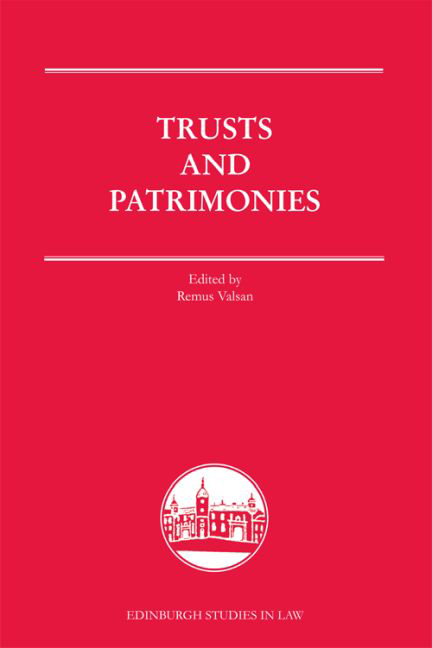Book contents
- Frontmatter
- Contents
- Preface and Acknowledgements
- List of Contributors
- List of Abbreviations
- Table of Cases
- INTRODUCTION
- PART I PATRIMONY AND THE COMMON LAW TRUST
- PART II PATRIMONY AND THE SCOTTISH TRUST
- PART III TRUST AND PATRIMONY IN FRANCE, QUEBEC AND THE NETHERLANDS
- 8 Translating Part of France's Legal Heritage: Aubry and Rau on the Patrimoine
- 9 Trusting Patrimonies
- 10 Dual Patrimony Dutch Style: The Magic Spell for Introducing the Trust in the Netherlands?
- Index
8 - Translating Part of France's Legal Heritage: Aubry and Rau on the Patrimoine
from PART III - TRUST AND PATRIMONY IN FRANCE, QUEBEC AND THE NETHERLANDS
Published online by Cambridge University Press: 15 September 2017
- Frontmatter
- Contents
- Preface and Acknowledgements
- List of Contributors
- List of Abbreviations
- Table of Cases
- INTRODUCTION
- PART I PATRIMONY AND THE COMMON LAW TRUST
- PART II PATRIMONY AND THE SCOTTISH TRUST
- PART III TRUST AND PATRIMONY IN FRANCE, QUEBEC AND THE NETHERLANDS
- 8 Translating Part of France's Legal Heritage: Aubry and Rau on the Patrimoine
- 9 Trusting Patrimonies
- 10 Dual Patrimony Dutch Style: The Magic Spell for Introducing the Trust in the Netherlands?
- Index
Summary
In a once important and now neglected book published in the 1950s, Germanborn art historian Nikolaus Pevsner sought to describe the “Englishness of English art” as part of a broader account of the geography of painting and sculpture. This was not, it would seem, undertaken as an exercise in identity politics or aesthetic nationalism – Pevsner used what his publisher called “the unbiased eye of a foreigner” to identify aspects of the seventeenth and eighteenth-century English character that found dominant and recurring expression in the visual arts. Quite apart from rather fantastical conclusions – the author contended that “practical sense, reason and tolerance” were for-reaching plastic themes in English art – Pevsner's book stands as a bold signpost for scholars in other disciplines, such as law, where efforts to ally culture and political geography are ongoing intellectual pursuits. If jurists were to look not for the Englishness in English art but, say, the “Frenchness” in French law, how could they go about doing it in a meaningful way? There are some fine studies that undertake this kind of venture from the perspective of the social sciences, but the humanities and the arts – no less alive to law's symbolic and persuasive attributes – are also deserving of attention when one situates law in culture and society.
The Pevsner project is of special interest to the comparative lawyer who works to draw French law out of its hexagonal setting; it is of interest too for legal translators who seek to transpose French legal writing out of its habitual language of expression. This paper offers a translation of a scholarly description of the patrimony in French law written by Charles Aubry (1803-1882) and Frederic-Charles Rau (1803-1877) as a means of presenting one of the great texts of nineteenth-century French legal literature to a new audience. It proceeds on three assumptions about legal translation as a means of giving voice to some of the supposed Frenchness of French law. First, some of the substantive genius of French property law is trapped in this familiar text, and, until it is translated, that part of France's legal heritage will be lost on some of those from outside trying to look in.
- Type
- Chapter
- Information
- Trusts and Patrimonies , pp. 163 - 198Publisher: Edinburgh University PressPrint publication year: 2015



